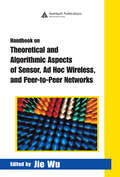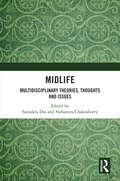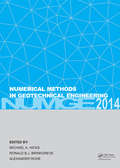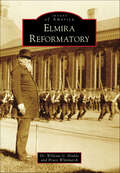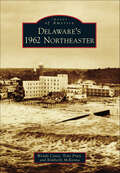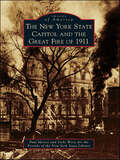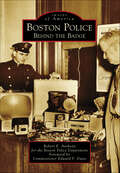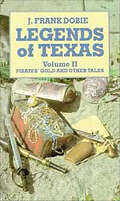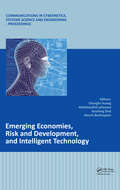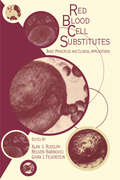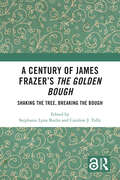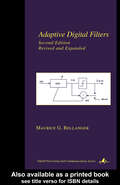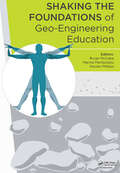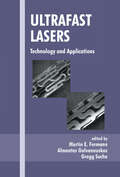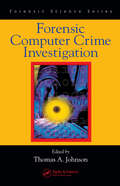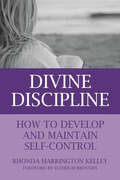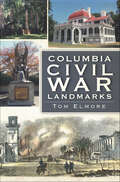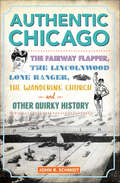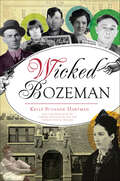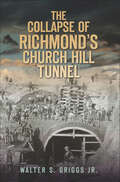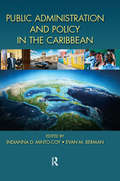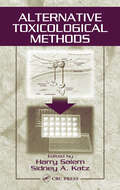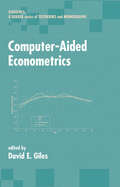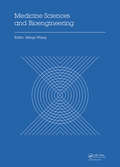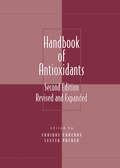- Table View
- List View
Handbook on Theoretical and Algorithmic Aspects of Sensor, Ad Hoc Wireless, and Peer-to-Peer Networks
by Jie WuThe availability of cheaper, faster, and more reliable electronic components has stimulated important advances in computing and communication technologies. Theoretical and algorithmic approaches that address key issues in sensor networks, ad hoc wireless networks, and peer-to-peer networks play a central role in the development of emerging network
Midlife: Multidisciplinary Theories, Thoughts and Issues
by Sanjukta Das and Nabamita ChakrabortyThis book is a rare and intriguing account of the midlife experience from a multidisciplinary perspective. It represents an insightful construal of midlife from the disciplines of philosophy, psychology, neuroscience, literature, sociology, and the fine arts. This volume provides an in-depth understanding of the middle phase of human lives which is the transitional phase at which a crucial transformation happens in the perspective towards life, society, and the world at large. It encompasses multiple methodological perspectives including empirical studies, descriptive and interpretative narratives, text analyses and revisiting existing literature. Since it addresses the issues of midlife from a multidisciplinary perspective, it would enable a wide variety of readers to connect with it. This book would be useful to the students, researchers and teachers of psychology, philosophy, neuroscience, literature, sociology, social work, film studies and the fine arts. It would also be an invaluable companion to professionals working in the field of Counselling Gerontology, Health and Social care, and NGOs.
Numerical Methods in Geotechnical Engineering
by Alexander Rohe Michael A. Hicks Ronald B.J. BrinkgreveNumerical Methods in Geotechnical Engineering contains the proceedings of the 8th European Conference on Numerical Methods in Geotechnical Engineering (NUMGE 2014, Delft, The Netherlands, 18-20 June 2014). It is the eighth in a series of conferences organised by the European Regional Technical Committee ERTC7 under the auspices of the International
Elmira Reformatory: Innovations In The Administration Of An American Penal Institution (Images of America)
by Bruce Whitmarsh William G. HinkleDiscover the activities and work carried on inside the Elmira Reformatory and the evolution of the criminal reform model through the lens of vintage images.The Elmira Reformatory, established in 1876 in Elmira, New York, was a testament to the most interesting, most scientific, and most hopeful treatment of the convicted criminal that has ever been tried in the United States. It conformed to what were considered sound theories, and the results were good beyond all expectations. Its inception was due to the genius and experience of Zebulon R. Brockway, who had practical training in prison management and was profoundly acquainted with the nature of the lawbreaking class of the 19th century. Elmira Reformatory contains images of the work done at Elmira in the late 19th and early 20th centuries. It is a compelling view of the activities carried on inside the reformatory and the evolution of the criminal reform model.
Delaware's 1962 Northeaster (Images of America)
by Tony Pratt Wendy Carey Kimberly McKennaDelaware�s March 1962 storm caused unprecedented destruction to life and property. Unusually high wind-driven tides carried breaking waves inland, destroying buildings and structures that, ordinarily, would have been beyond the reach of the surf. These photographs and the story they tell about devastation and destruction carry a strong message about hazards, risks, and the vulnerability of Delaware�s communities and environments.
The New York State Capitol and the Great Fire of 1911 (Images of America)
by Vicki Weiss Paul MercerIn the early morning hours of March 29, 1911, a fire broke out in the New York State Capitol at Albany. By sunset, the entire western portion of the building had sustained extensive structural damage. Within lay the entire collection of the New York State Library, almost completely reduced to ashes. Founded in 1818, this had been one of the finest research libraries in the country and home to innumerable manuscript and printed rarities. In a particularly bitter irony, the fire struck as the overcrowded library was four months away from moving into new, spacious quarters under construction across the street. Miraculously there was only one fatality, an elderly watchman, Samuel Abbott, whose body was not recovered until several days later. Images of America: The New York State Capitol and the Great Fire of 1911 includes recently discovered photographs documenting the construction of the building, beginning in 1867, as well as eyewitness accounts of its destruction.
Boston Police: Behind the Badge (Images of America)
by Robert AnthonyRecognized as the oldest police department in the country, the Boston Police Department has bravely protected and served the Boston community since 1838. Over the years, the department�s efforts to keep the public safe have been supported by the many divisions and special units that are prepared to respond to a wide range of public safety issues. Photographs of the harbor patrol unit, mounted unit, K-9 unit, homicide unit, and motorcycle unit take readers �behind the badge� to witness the exciting and sometimes dangerous situations that officers encounter when protecting the Hub. Honoring this great department and the men and women who have served it, Boston Police: Behind the Badge celebrates the long and noteworthy history of the city and department from days long gone by.
Legends of Texas v. 2: Pirates’ Gold and Other Tales (PELICAN POUCH)
by J. Frank DobieThere's treasure buried beneath Texas soil or stowed in caves covered over by stones. It might be the mother lode that's waiting to be uncovered or some Spanish pirate's chest of jewels and doubloons. Nearby a ghostly figure walks the dunes, or is it just an illusion brought on by the approaching dust storm?In this new mass market edition, J. Frank Dobie has collected accounts of some of the best known tales of booty hidden in Texas hill and dale as well as some eerie stories and the origins of Texas flowers, names, and streams. You will learn about "The Enchanted Rock in Llano County," "Lafitte's Treasure Vault," and "The Holy Spring of Father Margil at Nacogdoches." These lively stories reveal the love for adventure, independence, and mystery that has made Texas the state it is. And just as Dobie hoped, with these tales readers from all over can see the "richness of their own traditions."Dobie believed that worthwhile literature about this region had to be derived from an understanding of its life, lore, and history. Legends of Texas indirectly led to the founding of the Texas Folklore Society, the nation's second oldest folklore organization.
Emerging Economies, Risk and Development, and Intelligent Technology: Proceedings of the 5th International Conference on Risk Analysis and Crisis Response, June 1-3, 2015, Tangier, Morocco (Communications in Cybernetics, Systems Science and Engineering – Proceedings)
by Chongfu Huang Abdelouahid Lyhyaoui Nesrin Benhayoun Guofang ZhaiRACR is a series of biennial international conferences on risk analysis, crisis response, and disaster prevention for specialists and stakeholders. RACR-2015, held June 1-3, 2015 in Tangier, Morocco, was the fifth conference in this series, following the successful RACR-2007 in Shanghai (China), RACR-2009 in Beijing (China), RACR-2011 in Laredo (US
Red Blood Cell Substitutes: Basic Principles and Clinical Applications: Basic Principles and Clinical Applications
by John R. Wilson Sarah SharplesPresents an up-to-date treatment of research strategies, clinical and commercial developments, and regulatory and economic issues pertaining to the formulation of effective and safe red blood cell substitutes. The text examines regulatory and socioeconomic aspects of blood substitute products, and global tranfusion practices from the perspective of
A Century of James Frazer’s The Golden Bough: Shaking the Tree, Breaking the Bough
by Stephanie Lynn Budin and Caroline J. TullyThis multidisciplinary volume examines the ongoing effects of James G. Frazer’s The Golden Bough in modern Humanities and its wide-ranging influence across studies of ancient religions, literature, historiography, and reception studies.The book begins by exploring the life and times of Frazer himself and the writing of The Golden Bough in its cultural milieu. It then goes on to cover a wide range of topics, including: ancient Near Eastern religion and culture; Minoan religion and in particular the origins of notions of Minoan matriarchy; Frazer’s influence on the study of Graeco-Roman religion and magic; Frazer’s influence on modern Pagan religions; and the effects of Frazer’s works in modern culture and scholarship generally. Chapters examine how modern academia and beyond continues to be influenced by the otherwise discredited theories in The Golden Bough, ideas such as Sacred Marriage and the incessant Fertility of Everything. The book demonstrates how scholarship within the Humanities as well as practitioners of alternative religions and the common public remain under the thrall of Frazer over one hundred years since the publication of the abridged edition of The Golden Bough, and what we must do to shake off that influence. A Century of James Frazer’s The Golden Bough is of interest to scholars and students from a wide range of disciplines, including Ancient History, History of Religion, Comparative Religion, Classical Studies, Archaeology, Historiography, Anthropology, Folklore, and Reception Studies.Chapter 18 of this book is freely available as a downloadable Open Access PDF at http://www.taylorfrancis.com under a Creative Commons Attribution (CC-BY) 4.0 license.
Adaptive Digital Filters (Signal Processing and Communications)
by Maurice BellangerThis text emphasizes the intricate relationship between adaptive filtering and signal analysis - highlighting stochastic processes, signal representations and properties, analytical tools, and implementation methods. This second edition includes new chapters on adaptive techniques in communications and rotation-based algorithms. It provides practical applications in information, estimation, and circuit theories.
Shaking the Foundations of Geo-engineering Education
by Bryan McCabe Marina Pantazidou Declan PhillipsThis book comprises the proceedings of the international conference Shaking the Foundations of Geo-engineering Education (NUI Galway, Ireland, 4-6 July 2012), a major initiative of the International Society of Soil Mechanics and Geotechnical Engineering (ISSMGE) Technical Committee (TC306) on Geo-engineering Education. SFGE 2012 has been carefully
Ultrafast Lasers: Technology and Applications
by Martin E. Fermann Almantas Galvanauskas Gregg SuchaCovering high-energy ultrafast amplifiers and solid-state, fiber, and diode lasers, this reference examines recent developments in high-speed laser technology. It presents a comprehensive survey of ultrafast laser technology, its applications, and future trends in various scientific and industrial areas. Topics include: micromachining applications
Forensic Computer Crime Investigation (International Forensic Science and Investigation)
by Thomas A. JohnsonThe Digital Age offers many far-reaching opportunities - opportunities that allow for fast global communications, efficient business transactions and stealthily executed cyber crimes. Featuring contributions from digital forensic experts, the editor of Forensic Computer Crime Investigation presents a vital resource that outlines the latest strategi
Divine Discipline: How to Develop and Maintain Self-Control
by Rhonda Harrington Kelley PhDSelf-discipline is essential to success in all areas of life. Making the conscious choice to do what is morally right takes a great deal of strength. The source of this strength comes from God. Having learned the hard way that discipline requires training, Dr. Rhonda Harrington Kelley suggests a system of checks and balances for self-control. Noting her personal journey toward spiritual discipline, Kelley offers this thought-provoking, inspirational guide. Through self-motivation and control, the author encourages you to reap the rewards of leading a disciplined life. After years of struggling with her weight and other negative aspects of her life, Kelley concluded that she had the motivation for change but not a sincere desire to gain self-control. Her belief in God&’s power to bring calm and purpose to some of life&’s most uncontrollable situations helped change her life. More than just a self-help book, Divine Discipline: How to Develop and Maintain Self-Control offers specific guidelines for making positive lifestyle changes toward personal growth. Kelley provides valuable guidelines for nutrition, fitness, time management, and goal planning that highlight the importance of one&’s internal resources by employing inner strengths. This second edition provides new information and encouragement for those seeking divine self-control. The biblical quotes come from the New American Standard Bible published by Lockman. Through discipline, introspection, and spiritual belief, Dr. Kelley leads the wayward soul to the bounty of the Holy Spirit. Esther Burroughs provides the foreword. A well-known Christian speaker and author, she is on the staff of the Southern Baptist Convention Home Mission Board in the evangelism division.
Columbia Civil War Landmarks (Landmarks)
by Tom ElmoreCentered in the Confederacy's Atlantic states, Columbia was one of three untouched Southern capitals at the end of 1864. Its factories produced uniforms, swords, belts, bullets, gunpowder and cannonballs, all vital to the war effort, until the fiery onslaught of Sherman's invasion cut a swath through the city. Tom Elmore, local Civil War historian and tour guide, presents over sixty significant sites throughout the Greater Columbia area that were marked by moments of triumph and devastation during the war. Readers will find the stories behind both well-known and infamous places, including the Horseshoe on the University of South Carolina campus, the gruesome 1864 prisoner of war camp, the ruins of one of the largest textile mills ever built and the monument commemorating the spot where the great city was surrendered.
Authentic Chicago: The Fairway Flapper, the Lincolnwood Lone Ranger, the Wandering Church and Other Quirky History (The History Press)
by John R. SchmidtDiscover the history most Chicagoans don't know---the real Chicago Way.The Windy City is full of forgotten landmarks and unusual stories that rarely get the benefit of a guided tour. Meet the African-American congressman who paved the way for Harold Washington and Barack Obama, the South Side Jewish girl who became the president of a South American country, and the visiting Romanian queen who charmed the city. Learn when Chicagoans were paid to smile, how furniture sprouts on Windy City streets after a blizzard and why Smell-O-Vision seemed like a good idea. From an in-city ski resort to the nation's greatest train robbery, author John R. Schmidt offers a glimpse of the overlooked scenery of Chicago's past.
Wicked Bozeman (Wicked)
by Kelly Suzanne Hartman Gallatin History MuseumWicked Bozeman delves into a dangerous and dark pastThe Gallatin History Museum, housed in the old Gallatin County Jail, holds many secrets. From the house of ill repute on Mendenhall Street to the earliest jail break in 1873, the historic crimes are replete with con artists, forgers, robbers and the insane each leaving a trail of deceit and mystery. There is laughter, shock and the hard reality of a life lost to time behind bars. Using the original jail ledgers as a jumping off point, Museum Curator Kelly Suzanne Hartman takes the reader along on an investigative journey through Bozeman's seedier past.
The Collapse of Richmond's Church Hill Tunnel (Disaster)
by Walter S. Griggs Jr.Explore the facts and mysteries surrounding the history and collapse of Richmond, Virginia's Church Hill Tunnel. A must for fans of railroad and Richmond history.Richmond, the capital of the Confederacy, was in shambles after the Civil War. The bulk of Reconstruction became dependent on the railways, and one of the most important links in the system was the Church Hill Tunnel. The tunnel was eventually rendered obsolete by an alternative path over a viaduct, and it was closed for regular operation in 1902. However, the city still used it infrequently to transport supplies, and it was maintained with regular safety inspections. The city decided to reopen the tunnel in 1925 due to overcrowding on the viaduct, but the tunnel needed to be strengthened and enlarged. On October 2, 1925, 190 ft. of the tunnel unexpectedly caved in, trapping construction workers and an entire locomotive inside.In recent years, there has been a renewed interest in the tunnel and the mystery surrounding its collapse. There were cave-ins and sink holes above the surface for decades after the tunnel was sealed up, and in 1998, a reporter from the Richmond Times-Dispatch did an investigation, trying to determine the current condition of the tunnel. In 2006, the Virginia Historical Society announced its efforts to try and excavate the locomotive and remaining bodies.
Public Administration and Policy in the Caribbean (Public Administration and Public Policy)
by Evan M. Berman Indianna D Minto-CoyThe Caribbean is at a crucial phase in its development. Global and local pressures have seen the region losing its competitiveness, while it remains at risk of losing out on development gains made in the last few decades. These pressures are demanding improvements in the way government operates, particularly in its policy-making and administrative
Alternative Toxicological Methods
by Sidney A. Katz Harry SalemBringing together the recent and relevant contributions of over 125 scientists from industry, government, and academia in North America and Western Europe, Alternative Toxicological Methods explores the development and validation of replacement, reduction, and refinement alternatives (the 3Rs) to animal testing. Internationally recognized scientist
Computer-Aided Econometrics
by David E. A. GilesEmphasizing the impact of computer software and computational technology on econometric theory and development, this text presents recent advances in the application of computerized tools to econometric techniques and practices—focusing on current innovations in Monte Carlo simulation, computer-aided testing, model selection, and Bayesian methodology for improved econometric analyses.
Medicine Sciences and Bioengineering: Proceedings of the 2014 International Conference on Medicine Sciences and Bioengineering (ICMSB2014), Kunming, Yunnan, China, August 16-17, 2014
by Mings WangThis proceedings volume contains selected papers presented at the 2014 International Conference on Medicine Sciences and Bioengineering (ICMSB 2014), held August 16-17, 2014 in Kunming, Yunnan, China. ICMSB2014 was aimed at researchers, engineers, industrial professionals and academics, who were broadly welcomed to present their latest research res
Handbook of Antioxidants (Oxidative Stress and Disease)
by Enrique Cadenas Lester PackerContains new and expanded material on antioxidants in beverages and herbal products, nitric oxide and selenium, and the effect of vitamin C on cardiovascular disease and of lipoic acid on aging, hyperglycemia, and insulin resistance! Offering over 4200 contemporary references-2000 more than the previous edition-the Second Edition of the Handbook of Antioxidants is an up-to-the-minute source for nutritionists and dietitians, cell biologists and biochemists, cardiologists, oncologists, dermatologists, and medical students in these disciplines.
